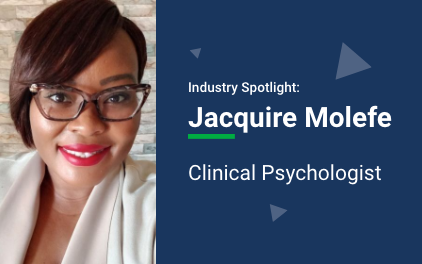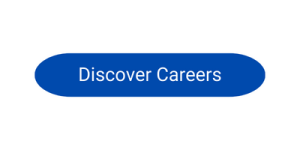The human mind and behaviour have captivated scholars and been the objects of interest for centuries. The conscious and unconscious. What drives people to do what they do? Positive psychology. Emotional intelligence. Talk therapy. What do these all mean and how can we make sense of it all? To understand the psychology of human behaviour, we’re shining the industry spotlight on Jacquire Molefe, a qualified and practising clinical psychologist, to answer some common and interesting questions.
Introduction and background
Tell us a bit about your background.
My background might be somewhat of the norm in the South African context, but I grew up in a single-parent household with my wonderful mother. My mother, a domestic worker, was a dreamer and wanted the absolute best for me. I think my mother injected that in me – an ambitious spirit. My mom values education and she made sure I went to the best schools. It was also this motivation and determination in her, that I think I inherited. I would describe myself as being highly ambitious and a top achiever, reflecting on where I came from and looking at how far I have come.
What made you decide to go into psychology?
I think one of the defining moments that contributed to my interest, I will say in human behaviour more so than psychology itself at that point, was during my time in high school. I had received a full scholarship to attend Redhill High, which is a private school and so, came from a different economic background than most of the kids that went to Redhill. The disparities and challenges I experienced stemming from my economic background contributed to a lot of my own anxiety and distress.
My marks started dropping and as a result, I was threatened with my scholarship being taken away. The most devastating part was that with these threats, there had not once been any kind of wanting to understand why my marks were dropping or just anything like that. This upset me and it puzzled me. I didn’t understand how there was no process of inquiry or any kind of conversation about “why”. This sparked my own curiosity about human behaviour as well as an interest in wanting to understand how and why stress and distress could have such an impact on an individual. So, this, coupled with I believe my natural and innate characteristic of wanting to help others, is where I think it all started.
What qualifications did you take to become a psychologist?
In high school, I did English, Afrikaans, French, Math, Biology, and History. Then I went to the general BA stream and majored in Psychology and Anthropology. Then I did a BA Honours Degree in Psychology and then finally, a master’s in clinical psychology. I also have a second-year level Human Resources Certificate. This really reflects the diverse nature and journey of psychology which I really believe for myself, is the biggest takeaway.
What additional certifications, exams, and memberships have you had to complete as part of your career journey?
After obtaining my Masters, I completed a two-year contact coursework degree (attending class and not online). Then, I did one year of internship; six months at Tara in the eating disorder and adolescent ward and the other six months in the adult ward. It took me another year and a half to complete the research component and then started my one-year community service at Odi District Hospital in Mabopane. Prior to community service, I completed my board exams with the Health Professions Council of South Africa (HPCSA), our regulatory body.
Getting started
What are the possible career paths for someone who has completed (or is about to complete) their psychology qualification?
- The possible career paths include working for the Department of Health at one of the hospitals or regional clinic facilities.
- There is also the option to go into private practice which, allows those who enjoy business and entrepreneurship the ability to engage in such.
Psychology is such a big part of life and there are more opportunities than what I believe the more “mainstream” career paths may offer. I think it’s about one’s vision, creativity, and determination to find a niche that one can potentially thrive in, using the skills that psychology affords an individual. It’s about making it work for you but obviously, doing so in line with ethics, as outlined in HPCSA principles and guidelines.
What skills and qualities should every psychologist have?
- The first skill one should have is being mindful of ethics and abiding by ethical treatment because “do no harm” is the ethos of the profession.
- Secondly, there needs to be a genuine interest in helping others and thus, having compassion and empathy are key.
- The ability to constantly set and maintain boundaries, as well as having a curious mind and being flexible.
- Finally, I would say working on seriously implementing self-care because psychologists are humans too, and work like this, though rewarding, can be taxing.
How important is it to stay updated on trends and emerging technologies in psychology?
It is important, as it is part of constantly upskilling yourself. We are already encouraged by the HPCSA to engage in ongoing training, to know how best to do the work and assist others.
Where can qualified psychologists work?
This depends on the specialisation. For example, I am a clinical psychologist which means I can work in clinical settings and in private (like all psychology specialisations). The HPCSA outlines the different scopes of each specialization and their appropriate contexts.
A day in the life of a psychologist
What does a typical day in your life look like?
It’s checking my calendar, knowing how many clients and/or patients I must see on any given day. It also looks like arranging and managing my calendar accordingly, to know how to prioritize certain clients and patients. There’s a lot of coordinating and management that needs to happen. I have to manage a lot of admin regarding invoicing, registering as a service provider with different medical aids, completing process notes of clients and patients, making phone calls, printing, and researching. There’s a lot that can go on in one day.
What are your clinical processes before, during, and after a session with a client?
There’s the preparation that goes on before a session. During the session, I would say the clinical process that happens there would be, listening with a “third ear” (as my trainers would say) holding the client in mind; being empathetic and non-judgmental. It also includes thinking about a diagnosis and formulating the client, all while listening to their narrative and staying in the here and now with them.
After a session, would be the writing of process notes and at times, confidential supervision with colleagues would be necessary, to obtain a different perspective on how best to assist the client.
How do you keep track of client notes and important information?
We have a confidential filing system to keep track of all notes.
What are the top three strengths and weaknesses of a therapist?
Strengths
- The ability to think about so much all at once, while still being able to be present in the room with the client.
- Being able to detangle, pull apart, and strategically reorganise those that clients bring to us and reflect it back to clients in a way that meets the client where they are at, so they can hopefully feel less burdened and stressed.
- The ability to hear what has not been outrightly said.
Weaknesses
- Sometimes taking on too much all at once which can lead to fast burnout.
- Sometimes it can take a little longer than one would like, to notice a blind spot.
- Struggling to self-care efficiently.
How do you stay motivated?
I think by having a deep respect for humanity and the human psyche and having a constant curiosity about the human psyche. The mind truly is a fascinating thing.
What do you enjoy the most about psychology?
When clients give feedback on the changes, they can see in their own lives and, see people grow into the best versions of themselves. That is truly remarkable.
What do you find most challenging about working in psychology?
Observing through the narratives spoken by clients, often the depth of the pain they experience, through the traumas they have endured and almost witnessing how trauma can change a person.
How do you handle stress?
My faith is very important to me, so prayer and reading the Bible are my bread and butter. I often engage in self-introspection and reflection. Journaling, talking to friends who are also in the profession; making time for fun; being intentional about eating well and exercising as often as I can, just to move my body. I also find being out in nature is very calming and helpful.
Undertsanding psychology
What are the few specific treatments that are offered only by clinical psychologists?
The scope for Clinical psychologists is to diagnose and treat severe mental illness, any treatment that is in line with this scope would be appropriate for the use of clinical psychologists. This could include Cognitive Behavioural Therapy (CBT); Dialectical Behavioural Therapy (DBT), Play Therapy techniques, Interactional Pattern Analysis (IPA), Family Therapy, and attachment-based Therapy, to name a few.
Why is it important to maintain boundaries with clients during a therapy session?
Boundaries are there to protect the client, as well as myself as the therapist. It helps maintain order and acts as a nurturing guide on how we should engage with one another; with dignity and respect.
What is the most common myth you have come across during your experience as a psychologist?
I have heard this so often; it makes me laugh and it has become quite a favourite of mine: That I can read minds lol.
Conclusion
What words of encouragement or advice would you give someone looking to become a psychologist?
Go for it and do it because you genuinely care and have a heart for people and because you feel like it’s a part of you somehow. Don’t do it if it’s not. Be honest with yourself and take the time to dig deep to really know your why.
The first step in anything is admitting your struggle and then getting help. Our mental health checkup assessment to help you live a healthier, happier, and more productive life tomorrow,










